Brandon Stanton's Blog, page 219
September 30, 2015
“ISIS looks for any reason to punish you. If they saw me with...
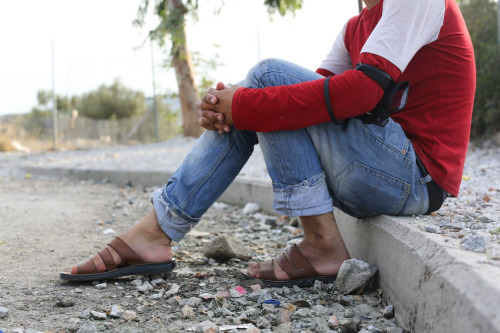
“ISIS looks for any reason to punish you. If they saw me with my face shaved, they’d punish me. If they saw me with these jeans, they’d punish me. Two of them walked into my electronics shop, and they asked me why my beard was so short. I tried to make an excuse about having just returned from vacation, but they said: ‘Come with us.’ I begged them to forgive me, but they took me to the judge and I was sentenced to three days of digging tunnels at the airport. They told me that they’d come get me when it was time. When they came to my house, I was hiding, so they took my neighbors instead. Everyone they took that day was killed by American planes.” (Lesvos, Greece)
“My father was a farmer and we had eight siblings. I went to...
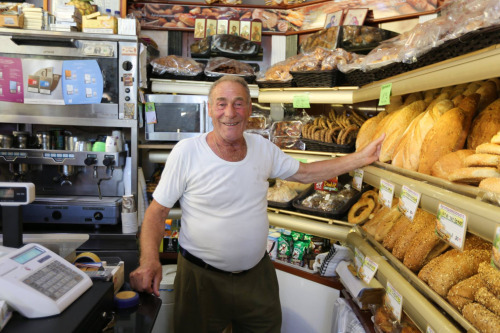
“My father was a farmer and we had eight siblings. I went to Australia when I was fifteen because my family didn’t have enough to eat. I was on a boat for forty days. When I got there, I couldn’t find a job, I couldn’t speak English, and I had to sleep on the street. I know what it’s like. So everyday I drive the van to the port and hand out bread to the refugees. My son is my business partner. He says, ‘Baba, please. It’s fine to help. But not every day.’ But I still go every day because I know what it feels like to have nothing.” (Kos, Greece)
September 29, 2015
“They fired rockets from a mountain near our house. They were...
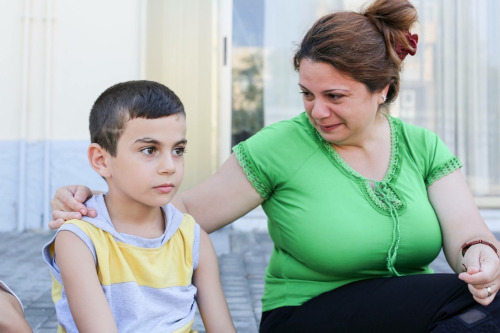
“They fired rockets from a mountain near our house. They were very loud, and every time he heard them, he’d run into his room and close the door. We’d tell him fake stories. We’d tell him that there was nothing to worry about, and that the rockets were far away and they would never reach us. Then one day after school he was waiting in a line of school buses. And a rocket hit the bus in front of him. Four of his friends were killed.” (Kos, Greece)
“Everyone here has been very nice to us. When we got to the...
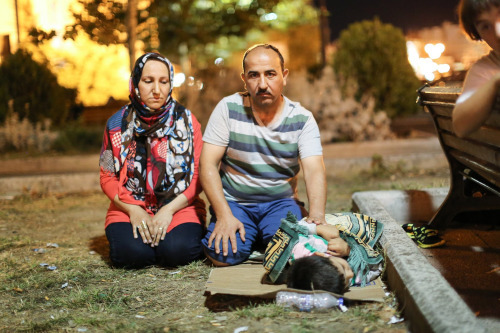
“Everyone here has been very nice to us. When we got to the beach, there were people there who gave us food and a hug. A priest even gave us this carpet to pray on. He told us: ‘We have the same God.’” (Lesvos, Greece)
(2/2)
“There is no security in Baghdad. We lived in constant fear....
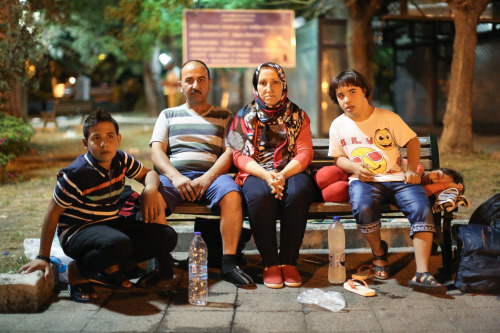
“There is no security in Baghdad. We lived in constant fear. We started receiving text messages one day. They said: ‘Give us money, or we will burn down your house. If you tell the police, we will kill you.’ We had nobody to turn to. We are poor people. We have no powerful friends. We don’t know anyone in the government. The text messages continued every day. We were so afraid that we could not sleep. We had no money to give them. We could barely afford to feed ourselves. So we said to ourselves: ‘Maybe they are lying. Maybe they will do nothing.’ Then one night we woke up and our house was on fire. We barely escaped with the children. The next day we received a text message. It said: ‘Give us money, or this time you will die.’ I replied that we’d pay them soon. We sold everything we owned, and we left. We thought we’d rather die in a plastic boat than die there.” (Lesvos, Greece)
(½)
September 28, 2015
“I wish I could have done more for her. Her life has been...
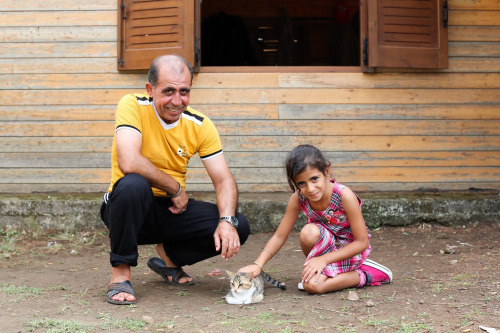
“I wish I could have done more for her. Her life has been nothing but struggle. She hasn’t known many happy moments. She never had a chance to taste childhood. When we were getting on the plastic boat, I heard her say something that broke my heart. She saw her mother being crushed by the crowd, and she screamed: ‘Please don’t kill my mother! Kill me instead!’“ (Lesvos, Greece)
“My husband and I sold everything we had to afford the...
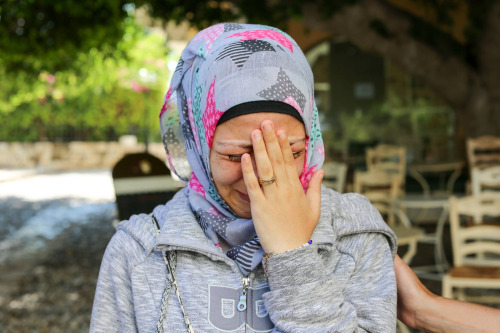
“My husband and I sold everything we had to afford the journey. We worked 15 hours a day in Turkey until we had enough money to leave. The smuggler put 152 of us on a boat. Once we saw the boat, many of us wanted to go back, but he told us that anyone who turned back would not get a refund. We had no choice. Both the lower compartment and the deck were filled with people. Waves began to come into the boat so the captain told everyone to throw their baggage into the sea. In the ocean we hit a rock, but the captain told us not to worry. Water began to come into the boat, but again he told us not to worry. We were in the lower compartment and it began to fill with water. It was too tight to move. Everyone began to scream. We were the last ones to get out alive. My husband pulled me out of the window. In the ocean, he took off his life jacket and gave it to a woman. We swam for as long as possible. After several hours he told me he that he was too tired to swim and that he was going to float on his back and rest. It was so dark we could not see. The waves were high. I could hear him calling me but he got further and further away. Eventually a boat found me. They never found my husband.” (Kos, Greece)
For context on the upcoming stories, it is important to...
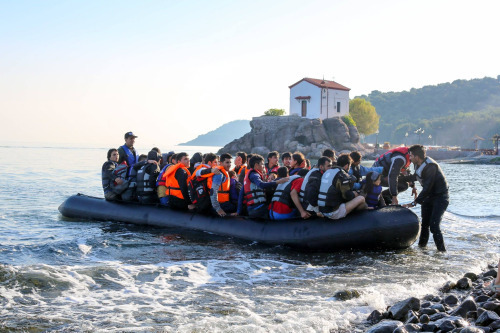
For context on the upcoming stories, it is important to understand the ‘plastic boat.’ The plastic boat is a central figure in the story of almost every refugee coming to Europe via Turkey. Every day, thousands of people arrive to the Greek islands on these boats. They represent one of the only ways that refugees can bypass immigration restrictions and throw themselves at the feet of Europe. The journey is extremely dangerous and many have drowned in the past few months. Despite paying Turkish smugglers $1500 per person, the refugees are loaded into boats that are filled to many times their capacity. The boats usually leave at night to avoid detection. Often the refugees arrive carrying nothing but horror stories. Unfortunately there is little waiting for them on the other side. If they are lucky, a handful of volunteers will meet them on the beach with a bottle of water. In Lesvos, where this photo was taken, the refugees will then begin a 50-mile walk to the port where they can register. The UNHCRand several NGOs are scrambling to provide bare necessities, but their resources are stretched to capacity. They can offer little beyond a guarantee of survival. The initial elation of the refugees at having reached Europe will quickly subside as many realize they cannot even afford the price of a ferry to get off the island.
September 27, 2015
“After one month, I arrived in Austria. The first day I was...
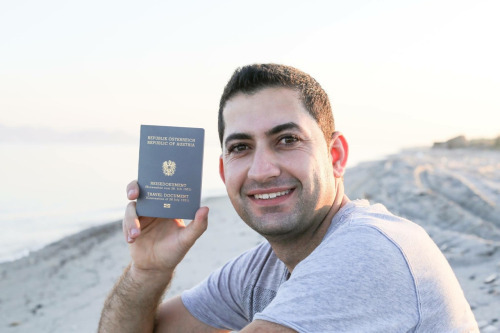
“After one month, I arrived in Austria. The first day I was there, I walked into a bakery and met a man named Fritz Hummel. He told me that forty years ago he had visited Syria and he’d been treated well. So he gave me clothes, food, everything. He became like a father to me. He took me to the Rotary Club and introduced me to the entire group. He told them my story and asked: ‘How can we help him?’ I found a church, and they gave me a place to live. Right away I committed myself to learning the language. I practiced German for 17 hours a day. I read children’s stories all day long. I watched television. I tried to meet as many Austrians as possible. After seven months, it was time to meet with a judge to determine my status. I could speak so well at this point, that I asked the judge if we could conduct the interview in German. He couldn’t believe it. He was so impressed that I’d already learned German, that he interviewed me for only ten minutes. Then he pointed at my Syrian ID card and said: ‘Muhammad, you will never need this again. You are now an Austrian!’” (Kos, Greece)
(6/6)
“The island we landed on was called Samothrace. We were so...
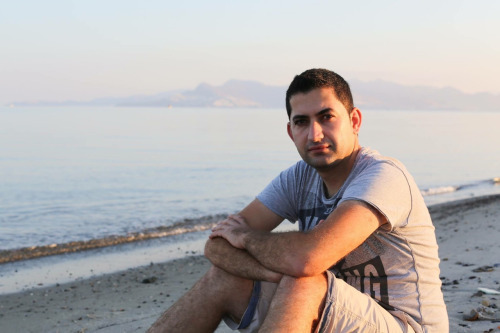
“The island we landed on was called Samothrace. We were so thankful to be there. We thought we’d reached safety. We began to walk toward the police station to register as refugees. We even asked a man on the side of the road to call the police for us. I told the other refugees to let me speak for them, since I spoke English. Suddenly two police jeeps came speeding toward us and slammed on the brakes. They acted like we were murderers and they’d been searching for us. They pointed guns at us and screamed: ‘Hands up!’ I told them: ‘Please, we just escaped the war, we are not criminals!’ They said: ‘Shut up, Malaka!’ I will never forget this word: ‘Malaka, Malaka, Malaka.’ It was all they called us. They threw us into prison. Our clothes were wet and we could not stop shivering. We could not sleep. I can still feel this cold in my bones. For three days we had no food or water. I told the police: ‘We don’t need food, but please give us water.’ I begged the commander to let us drink. Again, he said: ‘Shut up, Malaka!’ I will remember this man’s face for the rest of my life. He had a gap in his teeth so he spit on us when he spoke. He chose to watch seven people suffer from thirst for three days while they begged him for water. We were saved when they finally they put us on a boat and sent us to a camp on the mainland. For twelve days we stayed there before walking north. We walked for three weeks. I ate nothing but leaves. Like an animal. We drank from dirty rivers. My legs grew so swollen that I had to take off my shoes. When we reached the border, an Albanian policeman found us and asked if we were refugees. When we told him ‘yes,’ he said that he would help us. He told us to hide in the woods until nightfall. I did not trust this man, but I was too tired to run. When night came, he loaded us all into his car. Then he drove us to his house and let us stay there for one week. He bought us new clothes. He fed us every night. He told me: ‘Do not be ashamed. I have also lived through a war. You are now my family and this is your house too.’” (Kos, Greece)
(5/6)
Brandon Stanton's Blog
- Brandon Stanton's profile
- 770 followers



